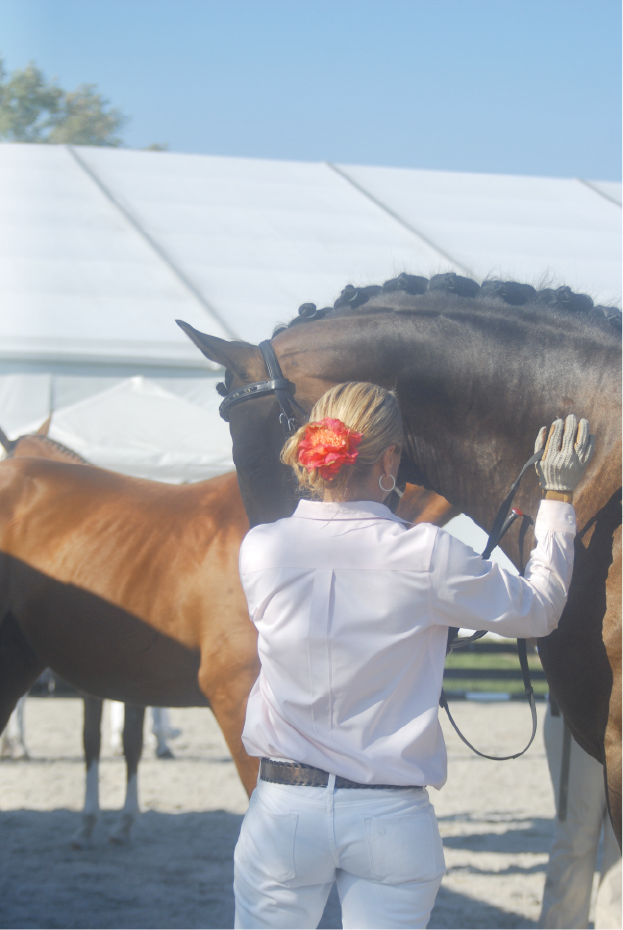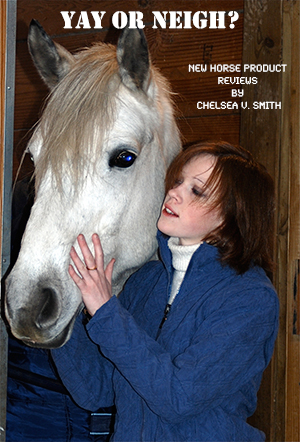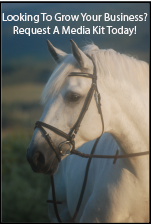Your Horse. My Problem.
By Tina Hammond
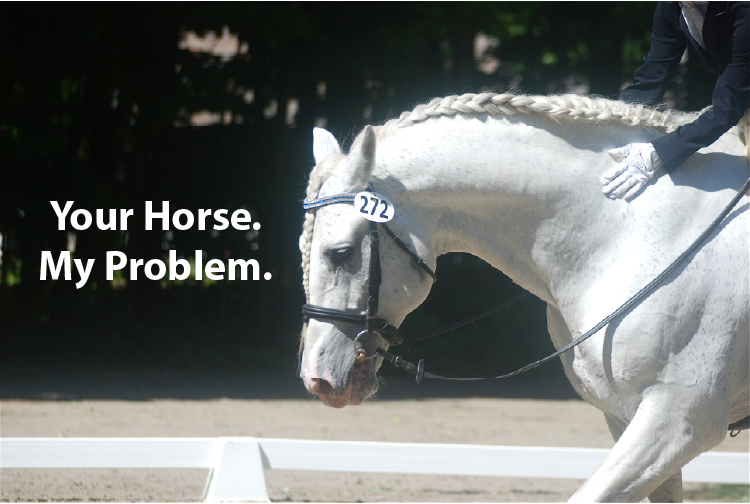
When do you make the decision to take your horse to a professional for training? For most horse owners it's after they’ve had a good go at it themselves. Things have gone awry. And now the horse is misbehaving badly. Usually it’s a simple matter of lack of understanding. But there is always a backstory.
Sadly us professionals aren’t told the backstory when the horse arrives. Why not? Perhaps because the owner figures we’ll freak out and turn their horse down. Perhaps we will. But one thing for sure. If the pro trainer turns it down it is best to walk away. It means they don’t know how to solve the issue or are afraid to try. Either way, walk way. Both are recipes for further upset.
Reality is it is your horse that is now my problem. As a trainer for over 20 years working for myself and for others I’ve seen it all. Retrained thoroughbreds that have medical issues are the most common miscreants that arrive. Diagnosis of a medical root cause can be tough to ascertain. Granted. But really poor stuff like habitual bucking, rearing, bolting etc. usually stem from something major going on with the horse. It can be a lack of understanding. But not usually. It’s pain. Pure and simple.
When horses move from pro yard to pro yard as a new client takes on a horse, the pros often chat behind the scenes. Cocktail medications to keep the horse ‘straight’ may be shared out aloud and the horse continues its life through the ranks. Usually on a spiral of decline. Still being passed from hand to hand. Vet to vet exam. All the time the reasons for its lack of performance clouded by the constant barrage of treatments thrown at it.
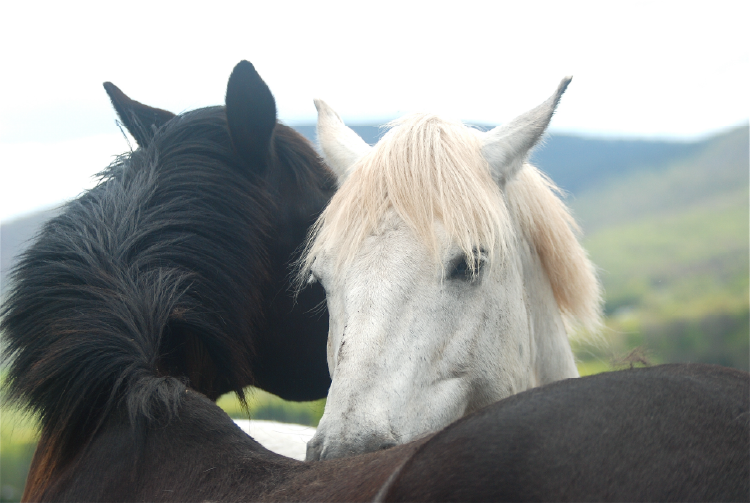
Many pros know the true benefits of simply turning a horse away. Pull the shoes and trim the feet, get the horse a good social partner or herd and let them go be horses for a while. A good while. A month won’t do it. I’m not suggesting ignoring the horse altogether. Attend to its needs for good forage and clean pasture, shelter and mineral/vitamin needs. But limit the grain ration, stop the meds unless they are properly and convincingly needed.
Steroid use in Thoroughbreds are often the reason mares don’t take right away when they come back to the breeding shed. Similarly German auction houses machine grind the youngsters into submission and excessive force to showcase their potential. Damage results. Mental and physical. Turning the horse away can help. Fresh starts a good idea.
The horse that arrives in my yard is there because something went wrong somewhere. It is very rare that a horse arrives because an owner simply wants it trained properly from the beginning. Everyone wants to save the money. I don’t blame them. But it is much easier to start a horse right from the start than to fix it later.
Whatever the issue the horse is experiencing honesty is the best policy if you want improvements to be fast. If your pro trainer has to spend 6 months figuring out what has happened to create a problem it is a waste of their time and your money.
Even in today’s theoretically educated marketplace, ill-fitting tack and poor horsemanship riding wise are still prevalent reasons for a horse not progressing in a positive direction in its training. Surprising perhaps but true. Many people buy a lovely well-fitting saddle but have little idea when they are left alone at any rate – on how to correctly place it on the horse. Madness.
Trouble is for many horse owners they’ve simply never been taught. Much at all. The days of apprenticeship and true attention to detail are long gone. Sad indeed. Riding schools seek to bring in the money by just passive activities that require little skill. A walk in the park. Maybe a trot. The occasional earnest one on one lesson in an indoor during winter.
I get it. People just want to get on and go. But what are we teaching them? Nothing good. The U.S. is very bad about riding schools and lesson programs. So many first-time rides happen on the trail at a ranch. Someone throws a hard hat on (if that) and mounts and off they go. And then truly, off they go. Hit the dirt. Or they get bitten by a horse or stepped on. All preventable stuff. Where has the horsemanship gone?
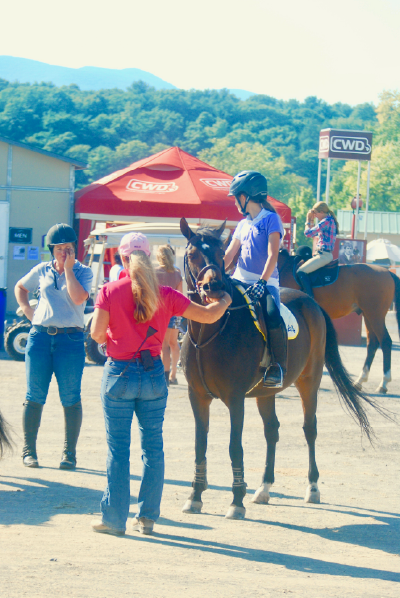
When your horse arrives at my barn door I can assure you from day one his every move is being evaluated. Experience teaches us a lot as professionals, and it is hard not to move to quick judgement. At some stage all trainers go there. Thinking they know best and have it all figured out. They don’t. But it doesn’t seem to matter. The noble horse takes the brunt of bad decisions.
I’ve learned to take my time. Give the horse time to settle. Work things out himself. See what he makes of it. Not throw everything at him 1,2,3 in military fashion. A horse will always reveal himself if you give him a chance. Make opportunities for him to shine. Follow his lead. Figure him out from the ground before you get in the saddle.
A bit like when you visit the Dr. and they ask for your notes on why you’ve come to see them. Let them direct the conversation. Don’t flood them with every last detail of your issue. Too much info in too short a time can lead them up the wrong path too. Give them time to explore, to assimilate the info. Low pressure equals better result.
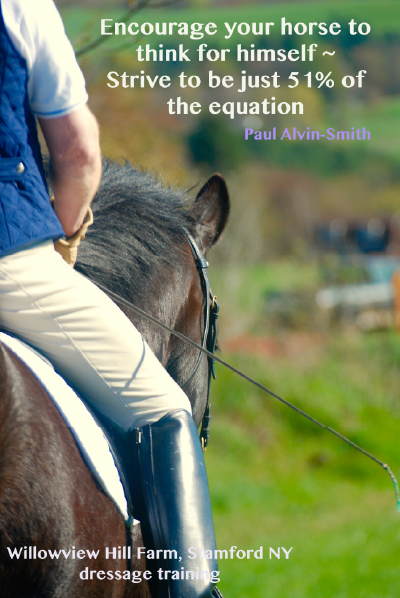
When I was younger working with my good friend and mentor, Paul Alvin-Smith, he told me when training let the horse be 49% of the equation. Yes, you need to bring leadership, but just enough to direct traffic. I’ve learned over the years that he is so right. The partnership percentage may change up and down a bit depending on the horse and the rider, and to be just 51% as a rider takes some talent. I’ve learned that also. But aim for that. And as an owner when you bring your horse to the professional choose that pro wisely.
You need to trust the trainer and they need to trust you. So be honest about the issues your horse has – but don’t overstate it. Keep it real. Let them ask questions.
Expect things to take time to resolve. Horses are not machines and neither are trainers. If you can start your horse off from the beginning with at least some help from a good professional. After all, you don’t know what you don’t know. And neither as pros, do we about you or your horse.
